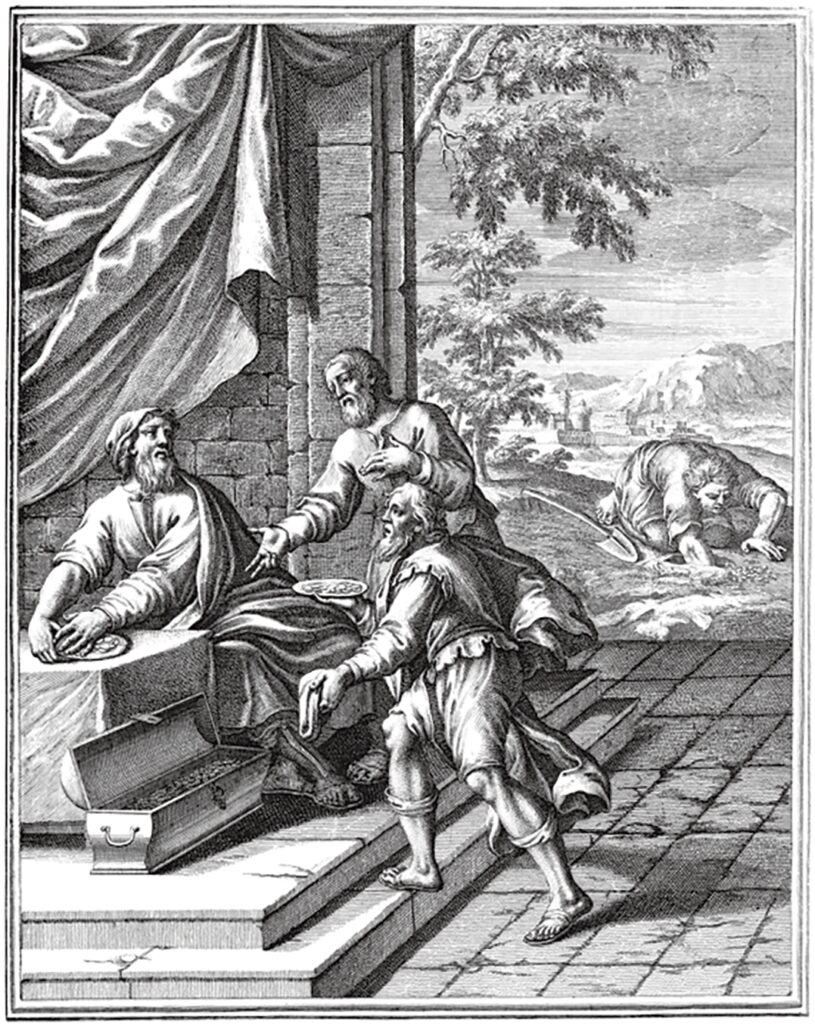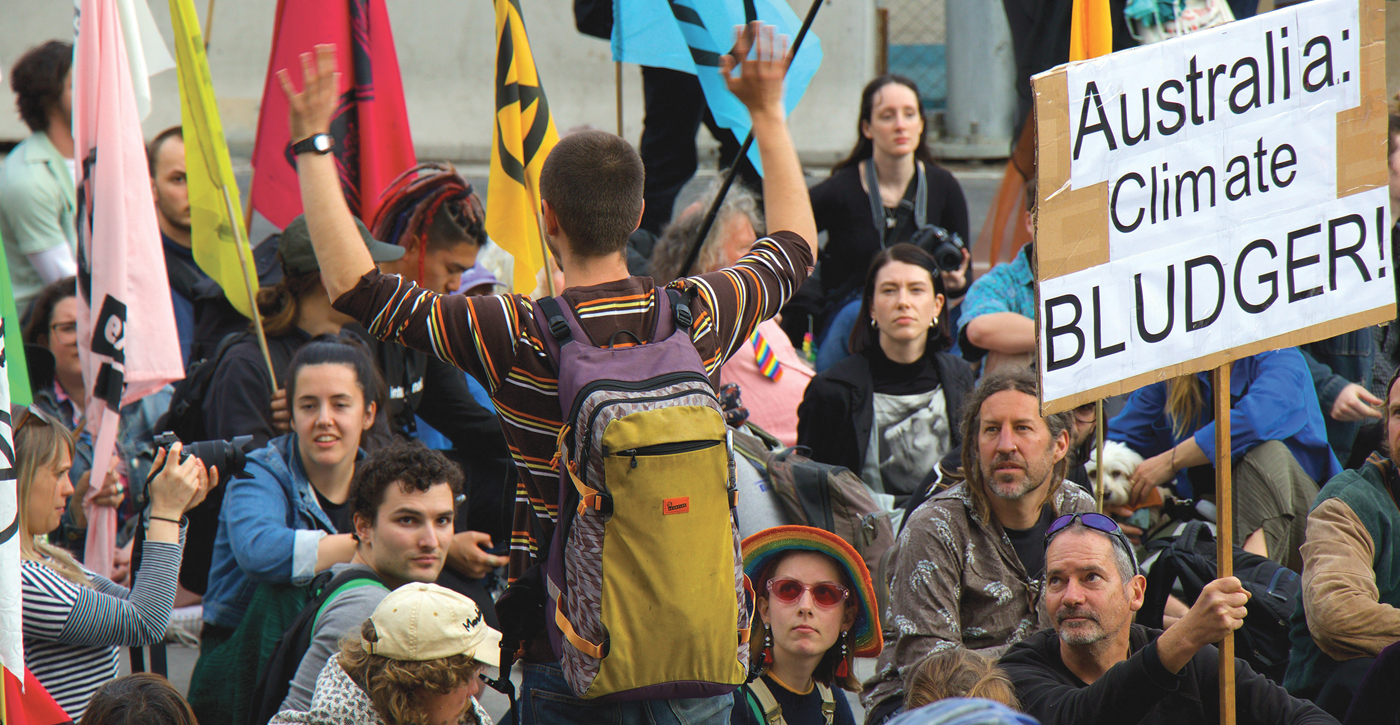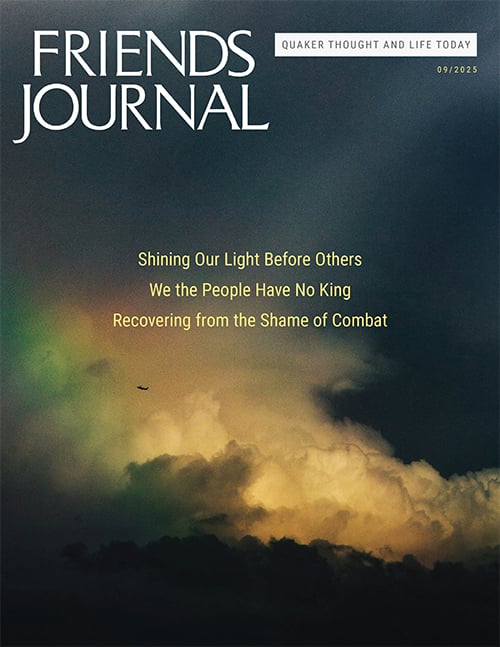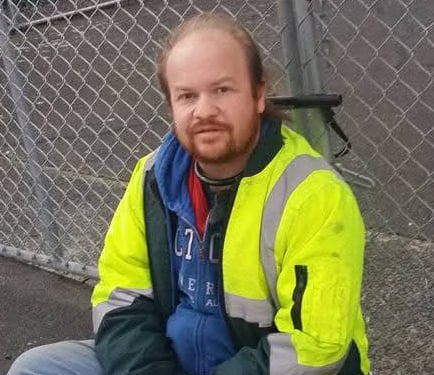The Necessity of Spiritual Resistance in Climate and Justice Activism
For many of us, it’s hard to picture police coming to one’s home as being threatening. Protected by privilege, we see police as just doing their jobs. They generally mean well, but occasionally their work means coming into contact with people who are protesting.
In Australia, the word “police” was first used in 1824 with the founding of the New South Wales Mounted Police. Their main task was to help settlers suppress First Nation resistance during the First Wiradjuri Uprising, also known as the Bathurst War. The police were and are the edge of the sword that seeks to cut people from the country. The colonial power wanted to convert the land into a capital asset and to continue to give that financial asset to fewer and fewer people: the wealthy at the top end of our plutocracy. The role of police is overlooked by most of us who are learning our colonizing histories. This dreadful, deadly role in the massacres gives a small insight into First Nations People fear of police and government agents, which also tore families apart and stole children.
After partaking in protests and direct action across Brisbane over the extreme violence, famine, and high death counts caused by the Israeli military in Gaza, a dozen plainclothes police came into our house and took me into custody for two nights. The last time I had been raided was two years before in Colo in the northern Blue Mountains northwest of Sydney. Blockade Australia (a network established to respond to planet destruction) was preparing two weeks of direct action on infrastructure spaces in the Sydney region, along with a call for a week of blocking roads in Sydney. These actions take intensive and meticulous planning and preparation. Most of us had been working full-time on the project for three years. After successfully blockading the Newcastle coal port in 2021 and the Port of Botany in 2022, we had called for a massive act of civil disobedience on the streets of Sydney.
Early one morning, a few of us had done some before-breakfast training at the camp for a particularly complicated action. A friend approached to tell me two people had been spotted on the road flying a large drone. I knew immediately this meant we were being surveilled by police and that our plans would need to change. What happened after is well-documented: more than 100 police, mostly from Strike Force Raptor (a squad focused on motorcycle gangs and drugs) swarmed the place. Ten people were arrested, all but two of whom had their charges dropped, despite spending a week in remand. Our phones and computers were seized. We were ejected from the space while police spent the night destroying protest equipment, even beheading one of the children’s toys (a large stuffed pink unicorn) and placing it prominently on a spike outside of the kitchen for people to see upon our return.
Even though it was a hard time, some of us still successfully organized the subsequent street protests in Sydney. After my arrest for that protest and while on bail, we were not allowed to contact each other. To make matters worse, after three days in the watch house, I emerged to find I had contracted COVID for the first time.
Though they were troubling times, the only regret I feel is that I could have been more useful on the day or stauncher in our response.
In London in March, six Youth Action activists were meeting in the Westminster Meetinghouse to discuss protests that demanded a trade embargo against Israel and payments to countries affected by climate change. While they were meeting, 20 police officers broke down the door and arrested the six women. A week later, two of the people arrested were still in custody on “conspiracy to conduct nuisance” charges. The event made me reflect on my own activism and that this raid was a sign that our chances to organize real resistance to this colonial machine are being actively repressed.
Recently, I watched a video of a young person from the Westminster raid after their release. The young person said, “We are having an effect.” Commentators in the English media cite new draconian laws passed by an elected Labour government in response to increasing resistance. Police and the governments do not react this way unless there is some headway being made to make change. Had we been able to pull off the planned Sydney-based actions at the time of the Colo raid, there was a chance that a large group of people would have joined: people who are concerned about the climate crisis and ongoing colonial violence.

Friends face uncertain times, and we are not sure how to act. We know writing letters to elected officials is not enough. Friends know—at least subconsciously—that there is a connection between our own future under a collapsing climate and the atrocities broadcast to us, but we are not sure what steps to take.
On the same day I heard about the raid in England, I was staying with some Friends, and the daily reading was the Parable of the Talents (Matt. 25:14–30). Jesus tells the story of a rich master who takes a journey. He leaves three of his servants with money to care for. When he comes back from his journey, he asks for his servants to show how they did. The first two invested the funds and doubled their money. The third one buried his money to keep it safe. The master is surprisingly angry at the third servant: though the other servants could have lost everything, they did the right thing by taking action. By burying the master’s money and playing it safe, the third servant incurred the fatal wrath of the master.
It’s a strange parable, but after sitting with it for a while, I was able to make sense of it. We stumble when we make decisions and act out of the design of the Light. To stumble though, you must be moving. As Friends, especially in these times of colonial violence and climate crises, we must sit in the Light, but then we must step forward. For me, the inspiration to step forward has always come from letting the Light shine on my conscience.
The parable of the talents shows us that we need to put a foot forward in order for the Light to show us where to go next.
During the peak of Extinction Rebellion (a UK-founded group that uses nonviolent civil disobedience to compel government action on climate change and biodiversity loss) in South East Queensland, people inside the group were concerned that our blockade might prevent ambulances from responding to emergencies. This could quickly affect our public perception. We weighed the circumstances of not acting on the climate crisis versus the risk to vulnerable people needing medical care now. I remember hours spent trying to feel what the Light wanted me to do. I was prompted to take to the streets and witness for the next generation and those suffering now under climate collapse. Now, years later, research supports that street-blocking protests have no effect on ambulances. People, including many Friends, have argued that blocking streets—as I felt led by the Light many times to do—turns-off the public from the cause for climate justice. A recent study by Yale University points to the opposite effect. In areas with high disruptive protest activity, votes for Green-aligned political parties have risen. Generally, when it is brought into the conscience of the public, people support greater climate action, even if the fossil-fuel-owned media harshly attacks climate protests.
I say all these things to bring you into the state of mind of someone who has done what many Friends may consider brash or unwise. Constant activism, including blocking streets, and many arrests has brought me to the point where I struggle to find most kinds of employment again. I cannot say I have regrets. There are times when I wish life were easier or fairer. There are times I wish more Friends had taken these steps, so there was more camaraderie. I also understand the call to safety and comfort and the question: Why should I take such a big risk if it won’t achieve anything?
It’s unfortunate in some ways that the servants in the parable of the talents had such good luck investing their goods. What would have happened to the wealthiest servant if the master came back to find he had gambled all the talents away on Nasdaq? Surely the master would not be happy and would condemn his hapless servant. The point of the story is that when you take a chance with the substance of the Light, you will always win. Has my activism affected any change in Australia? Are coal mines closing and carbon emissions falling? Is there an upswell of Christians and Friends joining full-time direct action for an end to colonial violence and climate damage? On the surface, the answer is no. I have gambled my talents and (so far) lost a lot.
The point of the parable of the talents is that it is better to lose everything then not to risk anything at all. Only action leads to the fruits of the Spirit. Police have raided places where I live three times. Angry magistrates have condemned me and sworn to make an example of my behavior so others will not follow. People lodged in the system of violent privilege only react this way when there is an effect. When there is fear of an ongoing effect in which more people are involved.
The parable of the talents shows us that we need to put a foot forward in order for the Light to show us where to go next. The climate crisis is overwhelming. Friends have descended from a spiritual lineage that thrives in the overwhelming and stagnates in the comfortable. This is not to say we seek to be overwhelmed or to do too much. Simply when the world at large seems overwhelming, it can be easier to trust in the Light and let it guide our steps. For far too long, we have not taken steps on this journey: concerning ourselves more with the ways of the world than with the calling of the Light. The world is a scary, distracting place.
Worries about respectability and money can keep us passive. Professional lobbyists tell us to keep calm and keep paying our bills. But then there’s the Light. The Light that made Quaker founder George Fox walk away from his home life and into the fields, against all common sense. That made many more ancestors walk knowingly into danger, imprisonment, and death to keep the Quaker witness in the public eye and the truth available to all. Without those Friends risking their talents, we would have no Society and no teachings to learn from. If people from our spiritual ancestry had considered the best practical use of their time, they would have stayed home. They would have buried their talents.
If we rest in our comfortable lives, there will be no descendants to pass our spiritual gifts onto. We only need to move. Sitting this one out is to bury our talents.





While I admire, and learn from, Greg Rolles’ activism, I am moved to comment on his understanding of Quaker nonviolence. At all stages of our activism, at stages of our thinking about and enactment of Quaker Testimony, we are extolled to be nonviolent at all levels. That he should take to blocking roads and freeways in protest at governmental climate policies, a witness he was ‘prompted’ to take ‘for the next generation and those suffering now under climate collapse’, is, in case, an example of moral collapse since it conforms to the idea that a few should suffer (e.g., those caught in an ambulance) so that the many eventually benefit. Nasty regimes the world over have used such reasoning to underpin their overall program. Quaker nonviolence is nonviolence , nonviolent in thought, word and deed.
Our nonviolence carries over, therefore, to our attitude to leaders and policymakers at all levels of governance who have declared war on their fellow citizens as well as the planet and its environments. Our habit as Quakers is to love, not demonise, them. And we love them all the way, and particularly so when they are at their most cruel and destructive. These fellow human beings, who share exactly the same DNA and one Consciousness with us, should indeed be opposed but with love, and there are many ways of displaying such love. Purely nonviolent civil disobedience is one way among many. Educating people is another, a long-practice of Friends: not only do we direct our Concerns to political and corporate leadership, but do so, more pertinently, to those upon whom such leaders depend – voters, investors, and employees. There are Quaker agencies who work very hard at that. And did not John Woolman do something similar? He travelled from one slave plantation to another quietly asking fellow Quakers whether, in owning human beings, they were happy doing so. He was effective–not totally, of course, because not even the most skilled civil disobedience, education program or personal persuasion can be totally, universally effective.
Our Quaker way understands the human condition; of necessity, it is incremental. That’s the reality, but one gilded with faith in the One-der of Love.
There is no evidence, as I stated in the article, of ambulances being delayed by protests. There are stories, abounding on the internet, used to repress protest rights and stray the focus from the extremity of the climate crisis. At worst the disruptions do not match breakdowns, accidents, special events like marathons or natural disasters. This is yet another example of privileged Friends ducking the responsibility of the need to take direct action, but instead rest in passivity and maintain power and wealth.
Friend Greg Rolles’ insulting reply, which therefore should never have been published, raises four points:
First, it ignores the real anxieties that such protests have produced in the past, produce in the present and will do so in the future. These anxieties are real and widespread. They are most certainly of concern to experienced Friends. His reply smears their genuine concern for the victims of such protests, dismisses the anxieties I’ve mentioned which can be named and dated.
Second, it insults, without credible information, Friends as ‘privileged’ who ‘duck responsibility’ vis-à-vis ‘direct action’. Most Friends, whom I know the world over and certainly here in Australia, are not privileged people, and many of them have years of direct action to their name, something about which the Society can also testify. It’s just that they choose not to blow their horn. That is to say, most Friends beaver away at their peace witness faithfully and quietly. It’s really our Society’s way.
Third, some Friends throughout our Society give talks, write books, run workshops, etc., because they know education is vital in respect to spreading love, peace, justice and compassion. This is something which I know Friend Rolles has denigrated in the past as ‘talking shops’ when it is obvious people have gained much from these efforts, efforts which have actually fortified Friends and others to undertake, yes, direct action. So, his reply is both unfair and I believe unQuakerly.
Finally, I am seriously charging Friend Rolles to take time out from his activism to critically review his one-dimensional understanding of the Peace Testimony, bearing in mind what Francis of Assisi said: ‘While you are proclaiming peace with your lips be careful to have it more fully in your heart.’ ‘Heart’ in his day meant the ‘whole of us.’ It’s great advice from a master of peace activism.
Sorry that Gerry seems so upset. I’ve never used the words “talking shops” in my life. I adore and appreciate all forms of community building and education. I have simply been calling for more commitment and dedication to the vulnerable who are effected by our Western lifestyle. This should include more sacrifice of wealthy people of faith in the West. I’m not sure why this constantly seems to rile a few Friends up, but I will continue to lovingly walk my path, seeking a deeper understanding of peace in myself and the world around us, as temperatures grow and wealth inequality (at least in Australia) continues to skyrocket.
‘I’ve never used the words “talking shops” in my life.’ Yes, Greg, you have.